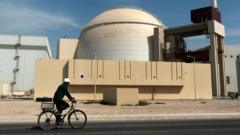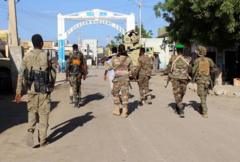In Oman's capital, Muscat, US and Iranian officials partake in indirect discussions regarding Iran's nuclear program. With Trump's re-imposition of sanctions after exiting the 2015 JCPOA, both nations must navigate delicate diplomacy amid concerns over Iran's uranium enrichment and its ambitions for nuclear technology.
US and Iran Engage in Indirect Talks Over Controversial Nuclear Program

US and Iran Engage in Indirect Talks Over Controversial Nuclear Program
Tensions rise as indirect negotiations in Oman seek to address Iran's nuclear ambitions following the US departure from the JCPOA.
In a significant diplomatic meeting, US and Iranian officials convened in Muscat, Oman, to participate in indirect negotiations regarding Iran's contentious nuclear program. This comes in the wake of former President Donald Trump's withdrawal from the Joint Comprehensive Plan of Action (JCPOA) in 2018 and the reinstatement of rigorous economic sanctions on Iran, escalating tensions between the two nations.
The core of the current conflict revolves around Iran's nuclear intentions, which the country claims are entirely for civilian purposes. However, the global community, including the International Atomic Energy Agency (IAEA), remains skeptical. Iran's clandestine nuclear facilities, uncovered in 2002, breached the Nuclear Non-Proliferation Treaty (NPT), leading to widespread suspicions about its nuclear ambitions.
Since the US's exit from the JCPOA, Iran has notably enhanced its nuclear capabilities by installing advanced centrifuges to enrich uranium beyond the limitations established in the original agreement. By March 2025, Iran was reported to have enriched approximately 275kg of uranium to 60% purity—potentially allowing for the creation of nuclear weapons, raising alarms among US officials who assert that Iran could convert this material into weapons-grade resources rapidly.
The JCPOA, negotiated to ensure Iran's nuclear program would remain peaceful, allowed comprehensive access to Iranian nuclear sites in exchange for international sanctions relief. However, Trump's administration derailed this agreement based on claims that it did not address Iran's ballistic missile program and was not a long-term solution. Trump’s decision was largely influenced by regional allies, particularly Israel, which views a nuclear-armed Iran as a direct threat to national security.
Trump has since expressed a desire for a new, stronger deal, highlighting the need for the complete dismantlement of Iran's nuclear capabilities. Iranian officials, in response, stress their willingness to negotiate but insist on the cessation of military threats from the US.
The talks in Oman appear to have been somewhat tentative, characterized by limited direct engagement. Iranian Foreign Minister Abbas Araghchi articulated a desire for an agreement founded on mutual respect, but cautioned that any military option from the US would undermine trust.
Meanwhile, Israeli Prime Minister Benjamin Netanyahu has laid out his position, demanding the complete elimination of Iran's nuclear program, stating that in the absence of a satisfactory deal, military intervention may be considered. Following Trump’s declarations about negotiations, concerns arose in Israel regarding potential compromises that could be viewed as diplomatic successes but might fall short of total disarmament of Iran’s nuclear capabilities.
The possibility of military action against Iran remains a contentious topic, with both the US and Israel possessing the capability to target Iran's nuclear sites. However, such offensive operations would be fraught with complexity, given the extent of Iranian defenses and the potential repercussions for regional stability.
With both parties navigating a landscape of defiance and cautious negotiation, the outcome of these discussions could hold significant implications for international peace and security.























